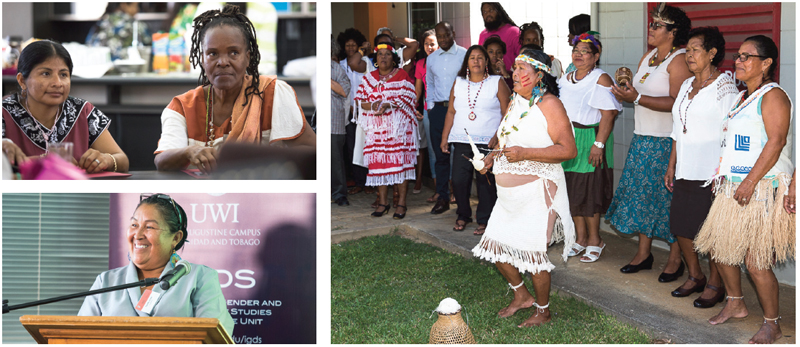|
April 2017

Issue Home >>
|
 \ \
 “When you can see yourself from a place of power you can transform your reality.” This was one of the highlights of Maya land rights activist Cristina Coc’s message during her keynote address at “Indigenous Geographies and Caribbean Feminisms: Common Struggles Against Global Capitalism” on March 31. Following her address, Coc was joined on stage by women who also hailed from her native Belize, representing Garifuna and other communities. The impromptu gathering was an emotional demonstration of solidarity after Coc called for candid discussions about racism and prejudice among people of colour. Her supporters were moved to tears by her struggles as an activist. “When you can see yourself from a place of power you can transform your reality.” This was one of the highlights of Maya land rights activist Cristina Coc’s message during her keynote address at “Indigenous Geographies and Caribbean Feminisms: Common Struggles Against Global Capitalism” on March 31. Following her address, Coc was joined on stage by women who also hailed from her native Belize, representing Garifuna and other communities. The impromptu gathering was an emotional demonstration of solidarity after Coc called for candid discussions about racism and prejudice among people of colour. Her supporters were moved to tears by her struggles as an activist.
Coc spoke about “Dignified Rebellion,” on the ways in which indigenous peoples and African descendants in the Caribbean and Latin America have been pitted against each other by colonial powers historically. She called for an end to this division and for unity in resistance to injustice. “All over the world, all throughout history, people have engaged in countless struggles for their dignity, for equality, for respectful and just societies, for democratic power relations; basically, for a liveable planet. We can draw the lines between these struggles as if the struggles were separate, affecting distinct social groups. But the distinction would be false. Our struggle is for a better world. One that is more just and where there exists the possibility for many worlds. In this sense, there has only ever been one struggle,” said Coc.
Coc’s address was filled with poignant, passionate anecdotes of her work with the Maya Leadership Alliance (MLA) and the indigenous rights advocacy organisation, Julian Cho Society, of which she is founder and director. Since the 1990s, the Maya people of Belize have been embroiled in a battle for recognition of their land rights. Coc provided testimony for the MLA and became a spokesperson for the organisation when in 2006 the Belizean government granted a US company rights to conduct seismic testing for oil on Maya land without consultation. The battle continued until 2015 with Coc even being briefly imprisoned.
To her, the battle was about more than land rights.
“In Maya culture our identity is defined this way: to belong. It is a sense of belonging often tied to land and I hear my Afro-descendant sisters grappling with identity because we do have an identity crisis and it is a colonial construct that caused it. I’m neither here nor there because for 500 years we’ve been told that our identity is no good, that being indigenous, being tribal is savage and backwards. So we’ve lost our sense of belonging,” she said. “When I talk about our fight to secure our customary land tenure and for recognition of our way of life, I’m not talking about land at all. I’m talking about seeing a marginalised group of people as equal and dignified. Not as 'those people' or 'the other' but as a part of this human race.”
“In Maya culture you belong to the land, you belong to Mother Earth, you belong to your community and you belong to future generations. That sense of belonging is what has connected my people to this piece of land that we so passionately struggle for recognition of our rights on that land. So our struggle has not been about challenging the State and the courts, but we’ve used the courts, we’ve used the letter of the law – a tool of the colony – to affirm our rights.”
Coc thanked The UWI for engaging in the important conversation surrounding indigenous land rights, women’s rights and activism. She said the “Indigenous Geographies and Caribbean Feminisms” symposium was a “gift” to many indigenous voices.
The three-day symposium was hosted at The UWI from March 30 to April 1. It was organised by the Institute of Gender and Development Studies in partnership with the Department of Geography. The event was also supported by the Antipode Foundation. Participants included representatives of indigenous communities, scholars and activists from Belize, Dominica, Guyana, Honduras, St. Vincent and the Grenadines, Suriname, and Trinidad and Tobago. The symposium included workshops on women’s empowerment, methods for confronting contemporary colonialism and environmental protection. The symposium also recognised the work of Honduran indigenous and environmental activist, Berta Caceres. Caceres was assassinated last year.

|





